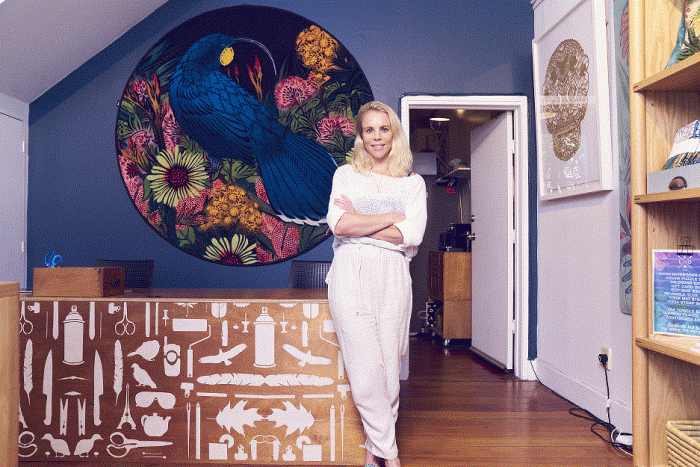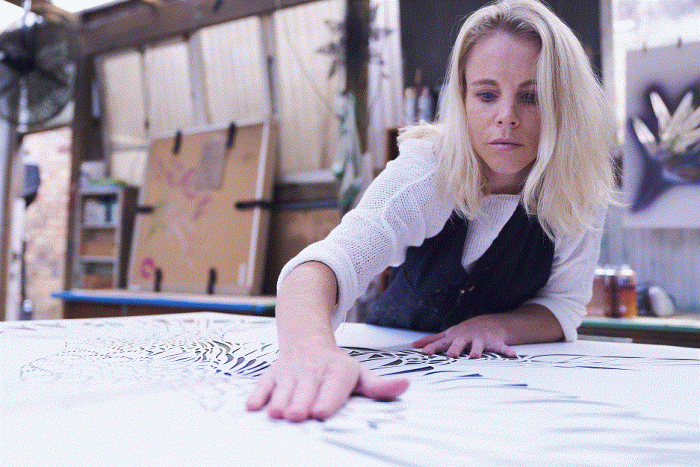Hit enter to search or ESC to close
9 July 2019
Flox on the art of business
Developing a unique, visionary style of New Zealand art cemented the Flox name both at home and overseas. But for Hayley King, the artist behind Flox, having a head for business has always been as equally important as having an eye for detail.
Hayley King has won plenty of plaudits for her unique visual talents. As Flox, you could say she has defined an entire movement within contemporary art: using aerosol and stencil to create vibrant works that are immediately recognisable in any environment.
Painstakingly crafted by hand, her original intricate stencilled work featuring New Zealand’s native birds, ferns and flowers made the Flox name as familiar to fans in Berlin as in Birkenhead or Blenheim.
Unique art, naturally, stems from a unique approach not only to her chosen medium, but also to the way in which she has built the Flox name and business. It’s a different take on what might be expected that can be traced all the way back to art school.

Business plans
“Even when I was at art school, I had a business plan; I think I was the only one of my peers who really established business goals at that point,” says Flox.
“I always took the view that, yes I’m a creative person and I want to make art for a living. But I always knew that in order to be successful at that, I’d have to ensure things moved along from a business perspective. To me it seemed foolish to be creating interesting art, but not having the means to get it in front of an audience.”
Flox says that during the first few years following her graduation with a Fine Arts Degree, she had her fingers “in all sorts of pies”, creating street art, pieces for exhibitions and establishing a clothing label. In fact, she counts the rag trade as a formative component of how the Flox brand has grown over the last decade.
“T-shirts are essentially billboards that people wear: create clothing that people want, and you get your message into places you’d never imagined possible,” she says.
It’s fair to say that getting the Flox message out to the wider world hasn’t been a problem in recent years. Not only has Flox had a lot of interest from large corporates and urban councils around New Zealand who recognise the intrinsic celebration of New Zealand’s natural elements in her artwork (street art installations in Wellington, Riverton and Timaru are three of Flox’s most recent community projects), she has also found plenty of fans overseas, ensuring Flox has become a successful international brand.
“Through both the physical Haus of Flox store in Auckland and e-commerce I’ve been able to expand both the nature of the brand, and its audience. I’ve always had my sights set on international markets; success breeds success in this context, because the more popular my designs become the more resources I have to develop my product lines further.”
Today, Flox artworks can be found on a selection of homeware products and a broadening stable of contemporary creations, all with an eye on sustainability. Additionally, fans can also pick up hand-painted originals, screen prints, light boxes and paper works that helped establish Flox’s unique style.
“I’m developing new styles and themes in my work. But I always have to be equally adaptive in terms of the business itself. I never want to be bored with what I’m doing. I always want to feel like I’m moving forward and now that the Flox name is established, I can be a little pickier about the projects I get involved in.
“Eight years ago, I felt like I had to say yes to everything. But I don’t have to do that if it doesn’t work for me or the brand anymore. I’m definitely one of those 100 percent committed types of people though. If I can see a bold idea that I know has life to it, I’m going to give it everything I have.”

Working with Crombie Lockwood
One partnership that Flox says had a nice symmetry to it from the get-go, was her work with Crombie Lockwood, who commissioned signature Flox artwork – the distinctive ‘Natural Native’ bespoke mural – for a variety of communication activities.
“I already had a relationship with Crombie Lockwood from an insurance perspective, but when I was approached about working on a piece, I was really keen. I’m impressed by the way Crombie Lockwood actually has products that can be tailored to people in the creative industries: I think they understand the risks and rewards that are intrinsic to the arts field.”
As to risks and rewards, Flox has stepped up to the former and enjoyed plenty of the latter. But what advice does she have for someone looking to establish a reputation and a successful brand of their own?
“Never pigeon-hole yourself into thinking you have to stick to one specific discipline. Being open to opportunities means you have the flexibility to hone your skills at something you might not have previously considered,” she says.
“Our parents’ generation centred their professional lives around working one job and rising up through the ranks of that one occupation. That’s no longer the norm for everyone though; a graphic designer might become interested in product design, for example. They might move from one discipline to another; for many people, that’s the norm.
“We live in a world where communication is so much easier than it ever has been before. We can discover new ideas or movements and engage in new communities of like-minded people from all over the world.
“But also, there is plenty of business advice and guidance out there too, available to help ensure that whatever path is chosen can be a successful one. If you’re establishing a different voice in your chosen field, you want to make sure you’re heard. Good business sense will help make that happen.”